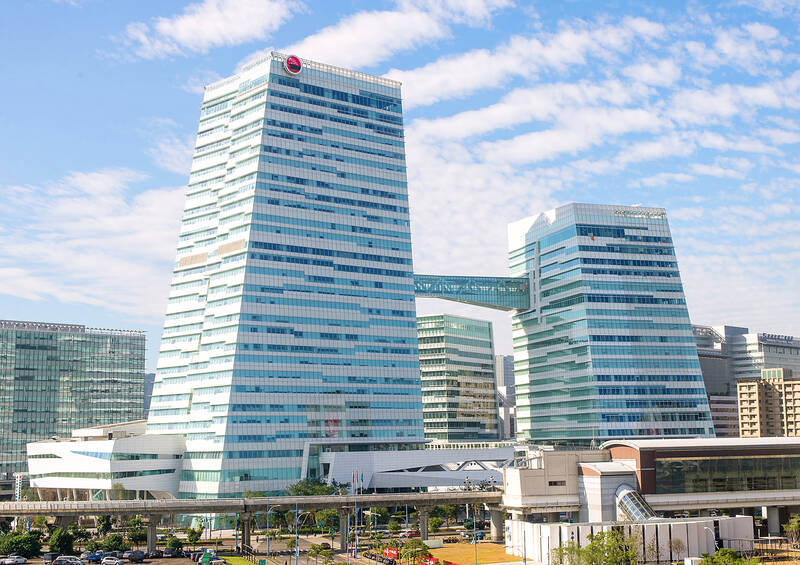CTBC Insurance Co (中國信託產險) on Thursday filed an application to set up a Web-only insurance company, the first such application in Taiwan, after its board of directors approved the proposal earlier in the day.
Insurance Bureau Director-General Shih Chiung-hwa (施瓊華) had previously told reporters that Fubon Financial Holding Co (富邦金控) and CTBC Financial Holding Co (中信金控) had expressed an interest in establishing such a business, while other insurance companies had inquired about application requirements.
A Web-only insurer cannot sell policies through physical channels or salespeople and its sales must be carried out completely online, the Financial Supervisory Commission has said.

Photo courtesy of CTBC Bank Co
A virtual insurer must be at least 40 percent owned by a financial institute. Of the 40 percent stake, at least 25 percent should be owned by a life insurance firm or a financial holding company with an insurance unit to ensure that the venture can comply with insurance regulations, the commission said.
A Web-only life insurer must have paid-in capital of at least NT$1 billion (US$31.36 million), while a non-life insurer must have at least NT$2 billion, it said.
The application review would take about five months, the commission said.
If approved, CTBC Insurance can launch the nation’s fist Web-only insurance company in the second quarter of next year, it said.
Fubon Financial president Jerry Harn (韓蔚廷) told an investors’ conference in August that the company had reservations about establishing a virtual insurer, as such a firm might not create significant synergy in the short term.

RECYCLE: Taiwan would aid manufacturers in refining rare earths from discarded appliances, which would fit the nation’s circular economy goals, minister Kung said Taiwan would work with the US and Japan on a proposed cooperation initiative in response to Beijing’s newly announced rare earth export curbs, Minister of Economic Affairs Kung Ming-hsin (龔明鑫) said yesterday. China last week announced new restrictions requiring companies to obtain export licenses if their products contain more than 0.1 percent of Chinese-origin rare earths by value. US Secretary of the Treasury Scott Bessent on Wednesday responded by saying that Beijing was “unreliable” in its rare earths exports, adding that the US would “neither be commanded, nor controlled” by China, several media outlets reported. Japanese Minister of Finance Katsunobu Kato yesterday also

Taiwan’s rapidly aging population is fueling a sharp increase in homes occupied solely by elderly people, a trend that is reshaping the nation’s housing market and social fabric, real-estate brokers said yesterday. About 850,000 residences were occupied by elderly people in the first quarter, including 655,000 that housed only one resident, the Ministry of the Interior said. The figures have nearly doubled from a decade earlier, Great Home Realty Co (大家房屋) said, as people aged 65 and older now make up 20.8 percent of the population. “The so-called silver tsunami represents more than just a demographic shift — it could fundamentally redefine the

China Airlines Ltd (CAL, 中華航空) said it expects peak season effects in the fourth quarter to continue to boost demand for passenger flights and cargo services, after reporting its second-highest-ever September sales on Monday. The carrier said it posted NT$15.88 billion (US$517 million) in consolidated sales last month, trailing only September last year’s NT$16.01 billion. Last month, CAL generated NT$8.77 billion from its passenger flights and NT$5.37 billion from cargo services, it said. In the first nine months of this year, the carrier posted NT$154.93 billion in cumulative sales, up 2.62 percent from a year earlier, marking the second-highest level for the January-September

‘DRAMATIC AND POSITIVE’: AI growth would be better than it previously forecast and would stay robust even if the Chinese market became inaccessible for customers, it said Taiwan Semiconductor Manufacturing Co (TSMC, 台積電) yesterday raised its full-year revenue growth outlook after posting record profit for last quarter, despite growing market concern about an artificial intelligence (AI) bubble. The company said it expects revenue to expand about 35 percent year-on-year, driven mainly by faster-than-expected demand for leading-edge chips for AI applications. The world’s biggest contract chipmaker in July projected that revenue this year would expand about 30 percent in US dollar terms. The company also slightly hiked its capital expenditure for this year to US$40 billion to US$42 billion, compared with US$38 billion to US$42 billion it set previously. “AI demand actually